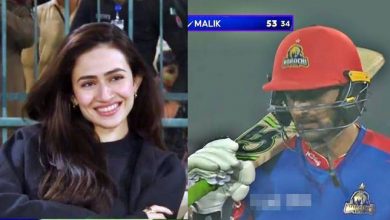I want to do a dark comedy: Sarmad Khoosat talks about next project, Manto’s influence on his work

In an intriguing and enlightening conversation with Khaleej Times, the highly-regarded filmmaker and actor, Sarmad Khoosat, embarked on an odyssey to unveil the profound legacy of the legendary Saadat Hasan Manto.
With a keen and candid perspective, Khoosat skillfully navigated the intricate terrain of Manto’s literary brilliance, offering a captivating insight into the profound influence that this unparalleled maestro of words has wielded on the acclaimed filmmaker’s artistic journey.
Encountering what he described as “snide remarks” often marked by the phrase “Aur bano Manto” (Become another Manto), Khoosat stumbled upon the literary genius quite serendipitously. Recounting this fateful discovery, he shared, “Our house had caught fire and we were living in a temporary place for some time and I chanced upon Manto from dad’s collection. When I read him, I was dumbstruck that this kind of scandalous literature exists in Urdu.”
Khoosat further revealed, “I went to a boy’s school and had an English education but Manto stayed within me quietly, though, in college we discussed him animatedly.” Commending the invaluable contributions of the esteemed writer, the filmmaker eloquently expressed, “Manto wrote unfiltered that could sometimes sound crude but he struck at the heart of the problem and broke all stereotypes of gender, religion, biases and class.”
Khoosat revealed his deep affinity for adapting the tales woven by the literary genius. Diving into the intricacies of this creative journey, he illuminated the process of connecting with Manto’s family, providing insights into the meaningful relationship that has since blossomed between him and the descendants of the iconic writer.
“For TV, I had adapted a Manto story called Harnaam Kaur and his daughter found my number and called me,” Khoosat shared. “First she was angry that the channel hadn’t called her. Then we got talking and I went over for chai and bonded with his three daughters. His middle daughter Nusrat has worked with Ayesha Jalal. Whenever I perform Manto, the girls have front-row seats and attend with their families. In fact, they encouraged me with my other work as well and loved Kamli.”
Contemplating an era marked by state-imposed literary censorship, Khoosat expressed how the act of exploring the works of progressive writers served as a profound escape for individuals during those challenging times. In the face of stifled expression, the written word became a sanctuary, offering solace and an avenue for exploring unfiltered perspectives and narratives.
“We come from an oppressed era,” Khoosat remarked. “Pakistan had a time when we read censored texts and if we didn’t do our own reading, there was a chance that we would get easily influenced and dictated by the ruling power. Also, we are self-censored as a culture and only good reading liberates you. In such times, Manto’s words, his perspectives and audaciousness seemed astounding and you marvelled at him.”
One might wonder if the essence of ‘Mantoism’ is subtly woven into Khoosat’s other works. Does the literary spirit and unapologetic narrative style of the writer find a nuanced presence in the broader spectrum of Khoosat’s artistic repertoire? Answering the query posed by the publication, Khoosat responded, “Not consciously, because Manto picked up characters like the milkman, the wrestler, the Sikh couple, the Jewish woman, and I did other work. But the sensibility of freedom was always there. Subconsciously we imbibe the sensibilities of the people we admire though our work might be something totally different.”
Khoosat’s cinematic exploration of Manto’s life in 2013 coincided with Indian actor and filmmaker Nandita Das’s biopic on Manto, featuring Nawazuddin Siddiqui. Despite the parallel timelines, Khoosat highlighted the distinctiveness of each cinematic venture. The convergence of these two cinematic narratives led to a meaningful encounter between Khoosat and Nandita at a Rekhta event in Delhi. “Both our films are different and I met Nandita at a Rekhta event in Delhi and we discussed our work,” Khoosat shared.
The coveted filmmaker’s cinematic journey has extended beyond his portrayal of Manto, with later films like Zindagi Tamasha, Kamli, and Joyland resonating with audiences globally. Amidst a diverse array of responses, ranging from accolades to constructive criticism, the anticipation builds around his next cinematic endeavour.
Shedding light on the same, Khoosat stated, “I want to do a dark comedy with an actress I haven’t worked with in a long time.” He added, “An artist is always ridden with self-doubt. But over the years, I have realised there is a loyal audience for my work. Thanks to them and Manto, my journey has just got more interesting and I have found a stronger voice.”





